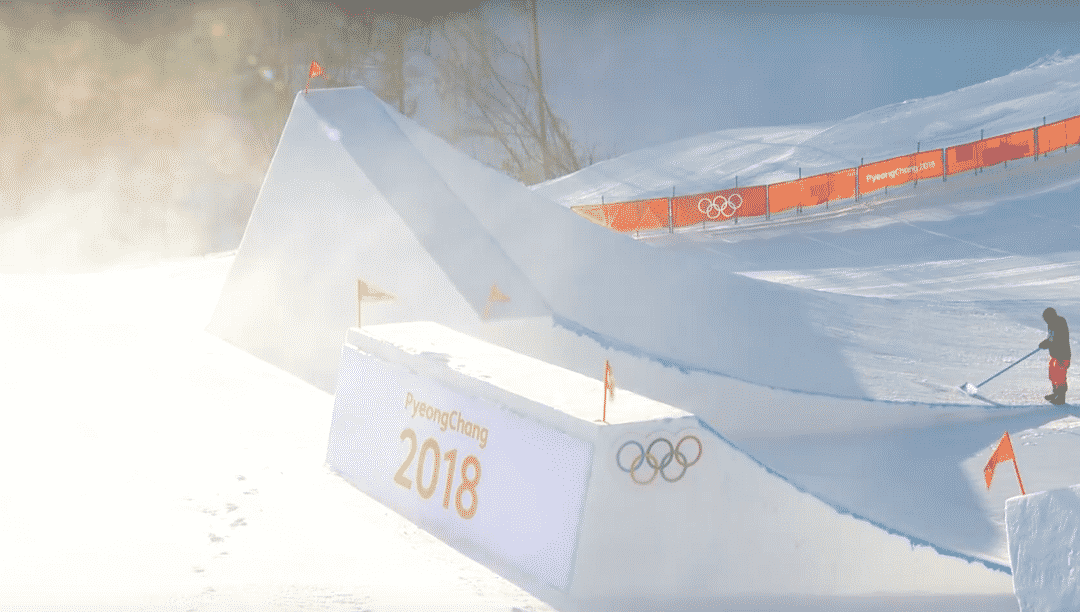Dear International Olympic Committee,
I have been an Olympics fan since childhood. I remember being eight years old, huddled close to the TV set, eyes locked on the screen as the women flipped, tumbled, and soared through their gymnastics routines at the 1988 summer Games in South Korea. Watching those young women–girls not much older than myself– gave me a sense of power I had never felt. Those gymnasts, with their strength, precision, and gravity-defying acrobatics, showed me and countless others around the world what people of my gender were capable of.
Fast forward thirty years to the women’s snowboard slopestyle event at the 2018 Olympic Games; we’re back in South Korea with a new generation of gravity-defying young women. Unfortunately, on this day, the girls were denied a fair chance to shine for the world. You, together with the International Ski Federation, have been heavily criticized in the press for your decision to run the event in the 35+mph wind. The gusts were strong enough to necessitate postponing multiple alpine events (where skiers do not leave the ground), and yet you sent the women snowboarders spinning and flipping off 20-meter jumps in the same dangerous conditions. The women’s event was further hindered by your decision to cancel the two-run qualifying round and cut a three-run final down to two runs. In snowboarding, a three-run final makes all the difference in the world–if you need proof, look no further than the awe-inspiring third runs put down by 2018 gold medalists Red Gerard, Chloe Kim, and Shaun White.
I get that competing in inclement weather is a natural part of outdoor sports. But on this particular day, the situation was entirely avoidable by simply postponing the event (as you had for the skiers). As a consequence, eighty percent of the runs resulted in crashes or incompletion. The women did a phenomenal job making the best of a very bad situation, and given the conditions, I am in awe of the courage and skill exemplified on the course. But in recent years women’s snowboarding has gotten to a place where double corks and back-to-back high rotation spins are now the norm. These tricks simply weren’t possible in the high winds. Unfortunately, to viewers at home, the sunny skies made it look as though the athletes were the problem and not the weather.
Just as the IOC expects athletes to put on the pinnacle of performance, the athletes have a right to expect the IOC to build the best stage. It’s a relationship built on trust, where both parties should want conditions that facilitate the best performance. By physically endangering these women when you had it in your power to do otherwise, and in not taking their opinions into consideration when making decisions affecting their livelihood, you broke this trust.
You also missed out on an opportunity to wow the world with these amazing women who collectively have the skills to be Olympic showstoppers. Because just as the competitors have been training for years to put on their best show, we–their present and future fans–have been patiently waiting to watch. Instead, we all looked on in fear, hoping that none of these talented women would be seriously injured. My heart breaks for the young girls all over the world who didn’t get to see the full inspirational performance these women were prepared to deliver. There were surely a few future Chloe Kims tuning in that day. But it’s unlikely girls or anyone watching saw the whipping wind, scary crashes, and palpable fear and thought “I want to do that!”
Sports have enormous physical, social and psychological benefits for girls and women. And yet in America only 4% of sports coverage is devoted to women, and female athletes and sports programs are vastly underpaid and underfunded in comparison to their male counterparts. Girls, unlike boys, are often discouraged from viewing their bodies as instruments of power. All too often, representations in media either objectify, infantilize or altogether exclude women and girls. But the Olympic Games presents a counter-narrative in which women receive more equal representation and female bodies are strong, capable and in control.
I shudder to think what would be different in my own life if back in 1988 the girl gymnasts had been denied an adequate stage on which to perform their craft. Because of those gymnasts, I was inspired to join a local YMCA gymnastics program, went on to participate in countless sports teams, had a professional athletic career, produced sports films, and was a brand and athlete manager for a prominent sporting goods company. It’s no exaggeration to say that watching the women gymnastics at 1988 Olympics had a monumental impact on my life. And I’m willing to bet that every female athlete, at any level, can trace their own athletic journey back to an inspiring Olympic memory.
So please, as you go forward with future Olympics, respect the women athletes and consider the effect they have on the people watching. Every chance females get to show their athletic best up on the global stage is a step towards making sports (and the world) a more inclusive place. After all, what is an Olympian if not the visible expression of human potential.
_______________________
Amber Stackhouse; a professional snowboarder.
See more on this Olympic disappointment with Cooler Magazine

